Three fairs were planned and held by Agro-Eco-Culture this year. We hope that this is only the beginning and organic trade will become a good tradition for Minsk dwellers. Similar monthly fairs are held in many European cities. This allows people to purchase quality products without going far and support farmers in their work for the benefit of people and nature.
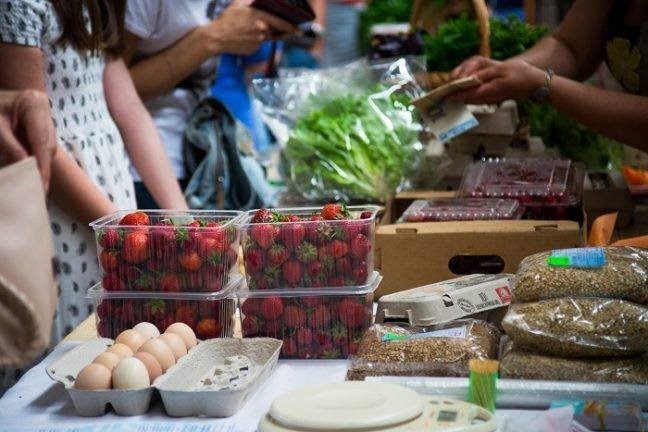
The first market
At the market Minsk residents were able to meet with farmers, learned what and how they grow. And, of course, all visitors had the opportunity to purchase «environmentally friendly» greens, vegetables, berries, honey, cereals, dairy products, eggs and what not. And if you liked the products, you could agree on supplies, as some farmers regularly bring their products to Minsk several times a month.
All the participants are united by organic principles of growing products. This means without the use of pesticides, artificial mineral fertilizers, using the principles of organic farming, without harm to nature and with a guarantee of health benefits for consumers.
“In the process of our activity we found that there are a number of problems in the sale of organic products,” says Lana Semenas, chairman of the board of Agro-Eco-Culture, PhD in agricultural sciences. – The first – farmers do not know where to sell, the second – consumers do not know where to buy organic products. Therefore, we decided to organize a series of fairs in the city center, where farmers and consumers can meet. Some farmers have a certificate indicating when and which organization checked them, and what products are certified. In addition to those we invited small producers that do not yet have a certificate. But we know them well and can guarantee that they use organic technology and do not use pesticides and mineral fertilizers. ”
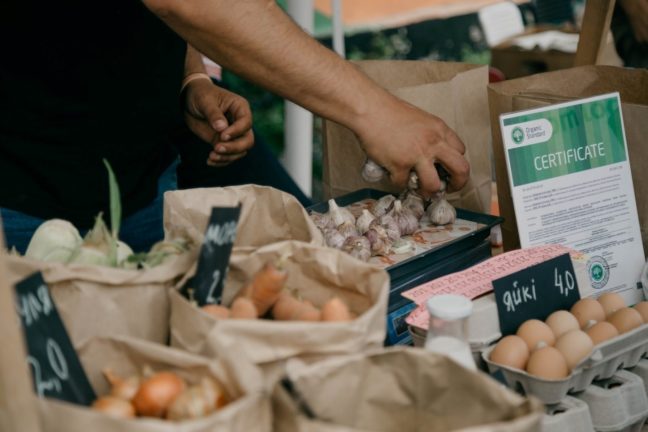
Organic certificated products
Unfortunately, our consumer is easy to fool. There are just over a dozen certified farms in the republic, but “eco-” and “bio-products” can be found on the shelves of almost every store. Obviously, these products have little in common with environmentally friendly ones. And finally, the most important reason is that the Belarusian consumer is not rich. “If he is asked to choose: buy an organic product or save money, he will choose the second option,” said Elena Sidorova, a certified organic farmer.
Therefore, one of the important tasks of the project is to introduce people to organic producers, to show how they work and why it is important for them not to change their approach. In addition, fairs can also be seen as a show-window for potential buyers – to order healthy organic products without dealers.
DAK farmers are in love with natural cheeses, so they breed goats – it turns out to be especially tasty from their milk. “A goat is a smart and noble animal, but difficult to maintain in our climate, which is not suitable for thoroughbred Nubians,” the owners admit. Goats are in free grazing, because it is an ecologically clean region, and they are fed with what is grown on a farm. The result is marvelous cheeses and yogurt! The consumers highly appreciated their dairy products at the markets.
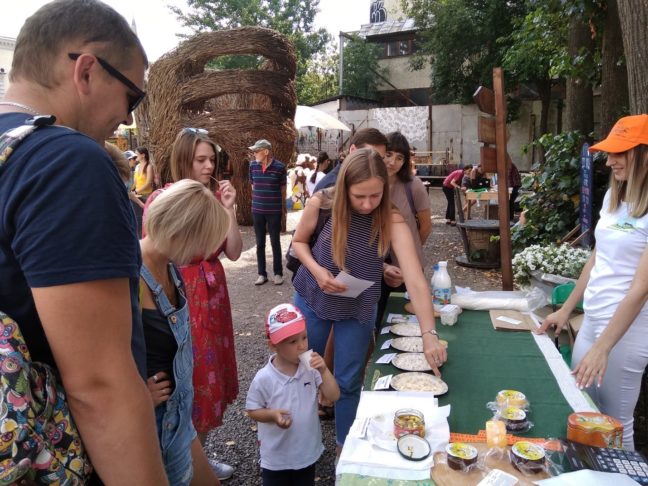
The degustation of milk products
“The buyer of organic products does not just purchase the product, but participates in the general movement to improve the quality of life and restore the natural balance of our country,” says one of the farmers Pavel.
The Consortium of Organic Farms (7 farmers) has focused on certain types of goods that are understandable and accessible to the public, with the prospect of complementing and expanding the range. «Despite the difficulties, we are taking the first steps in this direction. It’s important to be patient and work hard» says a certified farmer Dmitry Lutaev. Thanks to fairs, the Consortium has agreed to sell certified organic greens and vegetables to the catering company Monkeyfood, and negotiations are currently underway with a private kindergarten, the founders and parents of which understand the importance of healthy nutrition based on organic products without pesticides, chemical fertilizers and GMO.
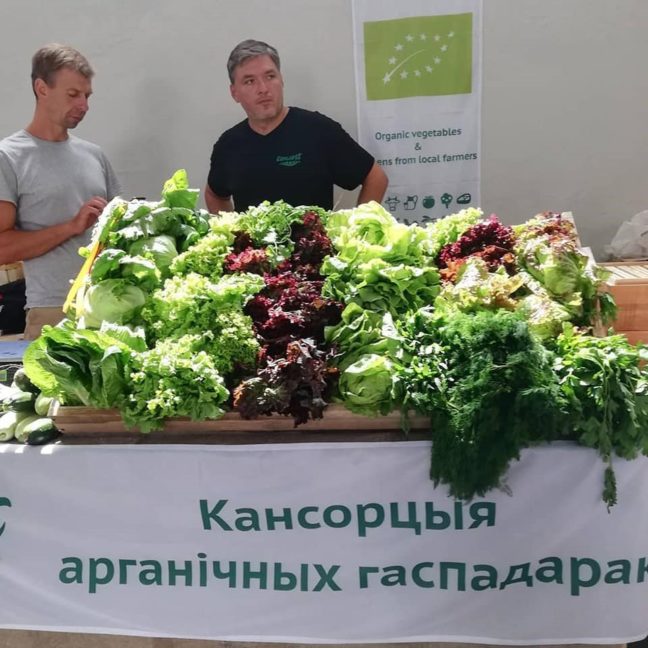
The Consortium of Organic Farms
Another participant of our fairs Pavel says about himself: “About 4 years ago I baked my first bread. It turned out pretty tasty, and I really liked the process itself. So many subtleties, nuances and sequences … Since then I have been interested in baking art. Thanks to the fairs, I was able to tell about myself and present several varieties of my bread. Now I have regular customers and I deliver bread to them on Saturdays. ”
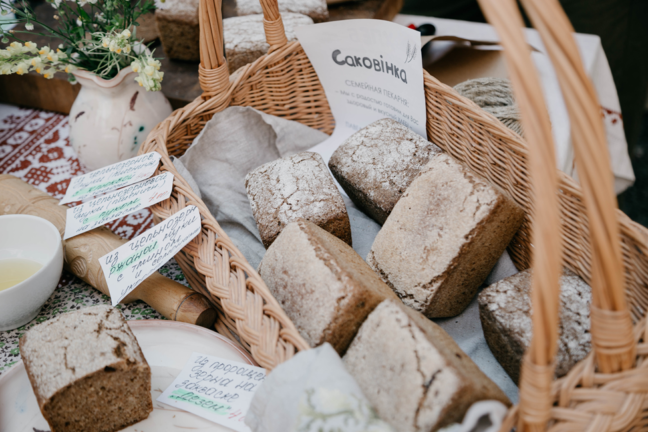
The craft bakery Sakavinka
The family farm (Dmitry and Angelika)producing greens is located near the capital, but the guys did not know where to sell their products, since there are many resellers on the regular market and the products are far from ecological. The farmers took part in all the fairs and were happy to report that they now have regular customers, and next year they want to begin the certification process of their products.
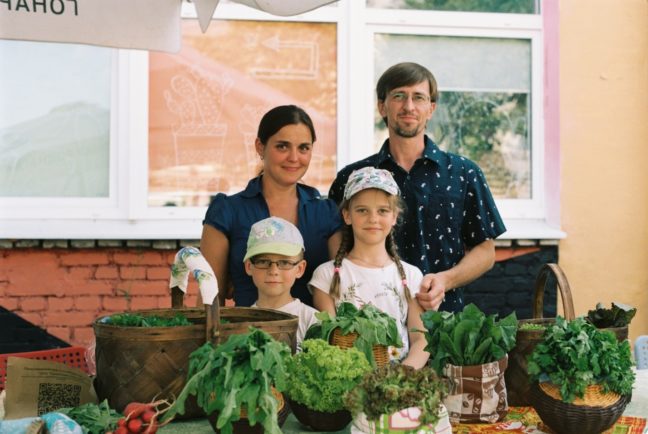
The family farm growing greens
Potter craftswoman Ekaterina Zhizhevskaya not only sold clay products made by her own and fragrant herbal teas – she found students to teach ceramics to them. And also thanks to the fairs a new tandem is being formed – the cooperation of Catherine’s pottery workshop and the children’s private educational centre.
2 more certified organic farms SidSad and Monki found a new sales market for their organic grain – farmers that breed poultry, goats and cows, using only environmental methods in the production of eggs and dairy products.
Sustainable development, ecological responsibility of producers, conservation of biodiversity, nature-like technologies – all these terms symbolize the process of agricultural biologization that has begun, the crown of which is organic farming. And we urge to go this way not alone, but in a team of like-minded people.
Irina Zakharova, Organic market manager

